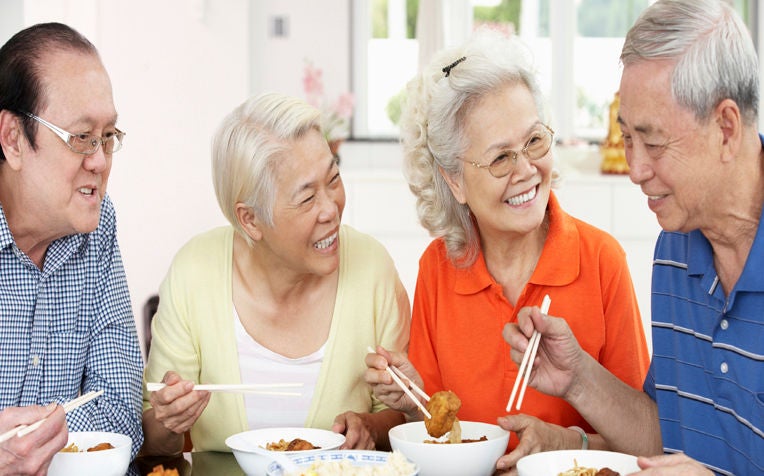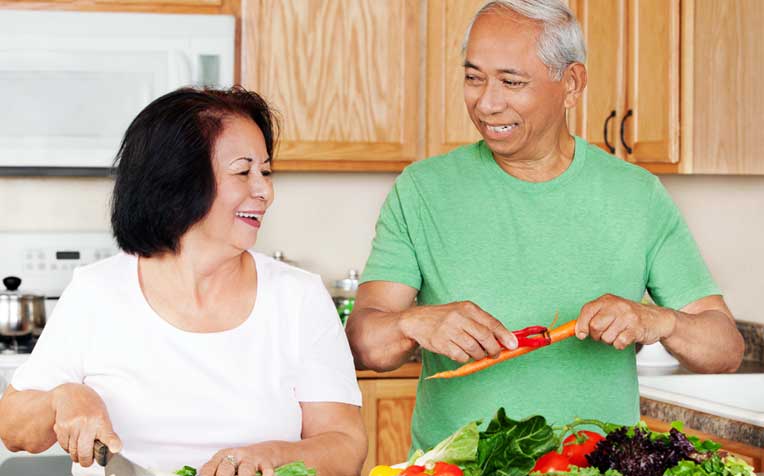
Eating right in your silver years is important.
However you plan to spend your retirement, good nutrition should form an important part of that lifestyle.
Especially since the ageing process is one of the risk factors for malnutrition – a condition where your body doesn’t have enough of the nutrients it needs.
The risk of malnutrition increases as you age. Factors like dentition, loss of taste, decline in functional ability and illness can affect your food intake.
Quantity vs. quality
It’s not simply a case of eating more of everything. In fact, it is normal to actually be eating less as we grow older.
Our physical activities lessen as we age. So as you’re moving around less, naturally, your energy needs also decrease. As do your food portions.
What’s more, we experience sarcopenia – the loss of muscle mass – as we age. As a result, our metabolic rate slows down by about 30 per cent by the age of 80.
So it becomes a question of not simply how much we should be eating in our silver years, but also what.
A healthy diet is about choosing the right types and right amount of food.
Watch the video!
6 Tips how seniors can eat healthier
1. Increase intake of wholegrains
This food group provides most of the energy for our daily living. It includes rice, noodles, bread, cereal and potatoes.
Healthy eating guidelines recommend about four to six servings daily, of which half should consist of wholegrain foods.
Wholegrains foods such as brown rice are a rich source of nutrients, like B vitamins, folic acid, iron and copper. They have been associated with lower risks of cardiovascular diseases, type 2 diabetes and colorectal cancer. They also maintain good digestive health thanks to their high fibre content.
Yet, the average older Singaporean (50 to 69 years old) is taking less than one serving of wholegrain products a day.
Easy ways to increase wholegrain consumption
Choose brown rice and wholemeal bread over white rice and white bread.
Choose oats over rice porridge as a breakfast dish.
Go for wholegrain crackers instead of plain crackers with your afternoon tea.
And instead of plain vermicelli, switch to brown rice vermicelli.
Wholegrain foods are readily available at all major supermarkets. Best of all, prices are comparable to non-wholegrain staples.
If you’re not used to the taste, you can start by mixing half a bowl of white rice with half a bowl of brown rice. Then gradually increase your portion of brown rice till you become accustomed to it.
2. Eat more fruits and vegetables
It is important to eat two servings of fruit and two servings of vegetables daily for good health.
Yet, most elderly in Singapore aren’t doing so. In fact, more than 60 per cent of Singaporeans aged 50 to 59 years do not meet the dietary recommendations for fruit. It goes even higher, 70 per cent, in the case of vegetables.
For those in the age group of 60 to 69 years, more than 70 per cent also do not meet the dietary guidelines for fruit and vegetables. This is worrying as a lack of fruit and vegetables means a reduced intake of essential vitamins, minerals and fibre.
Meeting the two-fruit daily requirement is really not that difficult. Take an apple or pear in the day, and a wedge of pineapple, watermelon or papaya after dinner, and you're done.
For greens, you could cook two vegetable dishes to complement one meat or fish dish for lunch or dinner.
3. Don't neglect lean meat, beans, fish and dairy
Surveys have shown that 40 per cent of Singaporeans aged 50 to 59 years and 50 per cent of Singaporeans aged 60 to 69 years are not meeting the dietary guidelines for this food group.
Older adults are encouraged to consume three daily servings of this food group, of which one serving should come from dairy foods or calcium-fortified foods.
Rich in protein, meat and alternatives are essential for the building and repairing of body tissues. A lack of protein will result in the slower repair of worn-out tissue and delayed healing of wounds, making them more vulnerable to infection.
Meat and alternatives are also a good source of B vitamins, zinc, selenium, phosphorus and iron.
Most of us can simply go for lean meat, poultry, fish and eggs to meet the required protein intake. Meanwhile, vegetarians can go for tofu, beans and legumes. These are extremely good sources of protein, very low in fat and loaded with fibre.
4. Get enough calcium
The most abundant mineral in our body, calcium gives our bones the structural strength they need to support our body. A lack of calcium will result in an increased risk of osteoporosis – a medical condition in which the bones become brittle and weak.
Unfortunately, about 50 per cent of Singaporeans aged 50 to 59 years and about 60 per cent of Singaporeans aged 60 to 69 years are found to have insufficient calcium intake.
Dairy products like milk, yogurt and cheese are rich sources of calcium. Calcium can also be found in tofu, tau kwa, almonds, sardines and other fish with edible bones, as well as dark green leafy vegetables.
5. Cut down on salt (sodium)
The average Singaporean consumes about 9g of salt a day, which is more than the recommended daily intake of 5g (one teaspoon).
Yet, controlling our sodium intake can help to reduce the risk of high blood pressure (hypertension), and stomach and nasopharyngeal cancers.
So how can we eat less sodium? Here are a few easy steps:
When eating out:
Taste your food first, before adding extra salt or soy sauce.
Ask for less salt or sauce to be added to your food.
Avoid drinking up soups and sauces.
When cooking at home:
Limit your use of salt, soy sauce, stock cubes, MSG and seasonings.
Flavour your food with natural herbs and spices like garlic, onion, ginger or cinnamon.
Avoid using salty preserved foods like salted egg, salted vegetables, luncheon meat, salted fish and ham.
6. Always stay hydrated
Dehydration occurs when a person loses more water than he or she takes in. And contrary to popular belief, it can happen even when we’re indoors – where many elderly spend most of their time.
We need fluids to regulate our body temperature, maintain blood pressure and eliminate waste products from our body. Go for plain water or unsweetened drinks instead of sugar-sweetened beverages. Generally, aim to drink around 8 glasses of water per day.
Those with fluid restrictions due to medical conditions should consult their dietitian or doctor to determine how much they can drink.
Ref: R14
Check out other articles on healthy ageing:
5 Easy Ways Seniors Can Stay Healthy
7 Common Ageing Problems Faced by Seniors
Why Seniors Need to Be Vaccinated
Contributed by


















 Get it on Google Play
Get it on Google Play